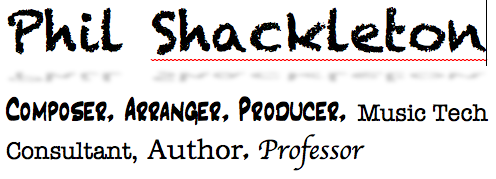I make music with technology. The music dictates the technology, not vice versa… but the technology is critical to the life of most composers/arrangers/producers these days. I’ve heard that in the early days of computers, computer programmers were recruited from the ranks of composers, because they understand working in a “language” with “rules” but that requires constantly flexible application of them, attention to minute detail, and so on.
These days, when everyone wants a demo, and when composers and arrangers often get involved deeply in recording and/or production, the technology has to be understood and employed efficiently. That means choosing the best tools for the job, being willing to learn the use of new tools, and learning the concepts and fundamentals that underlie them all.
I compose with Logic Pro because it is a composer’s tool much more than a copyist’s tool (like some common “engraving” music software). If I was a copyist (always starting with a known notational goal already in mind), I’d probably use something else, maybe Sibelius. But Logic Pro makes it easy for me to change my mind, let’s me do large, complex tasks quickly, and is very forgiving in the matter of work process. I can think musically the way I want to think, and use the software to support that, instead of letting the software force me to think in an essentially non-musical way in order to get to a certain product, notationally or sound-wise. Most importantly, Logic makes it easy for me to just play the music as I hear it, and then work with it notationally after the fact in reasonable ways.
I learned to compose with pencil, paper, my ears, and a piano. I always figured out how I wanted the music to sound, first, then thought about the notation. Logic Pro lets me keep thinking that way.
But then, after I’ve used Logic Pro to convert my musical imagination into sound and notation, the software gives me enormous production power to record live musicians, mix any way I want, use plug-ins of every imaginable sort, and generally apply as much complexity to the production process as I feel is musically helpful.
Having said all that, I regularly use Pro Tools because sometimes I work in studios that use it, and I think Sibelius is a fine tool for making the music “look” pretty. But at the end of the day, I haven’t noticed that performers play music printed out of Sibelius any better than they play music printed out of Logic, and I’ve had LOTS of opportunity to observe both…. though for engraving publishing quality notation, Sibelius is a great tool.
I keep hoping that Avid will really integrate Sibelius fully into Pro Tools, creating a product that truly competes with Logic Pro’s level of integration between MIDI sequencing, notation, and audio recording/editing. But they seem quite far from accomplishing that at this point, and of course that still doesn’t account for Logic Pro’s ability to do real-time MIDI signal processing and routing in its Environment window, a bit of which I put in the “featured image” for this post.

